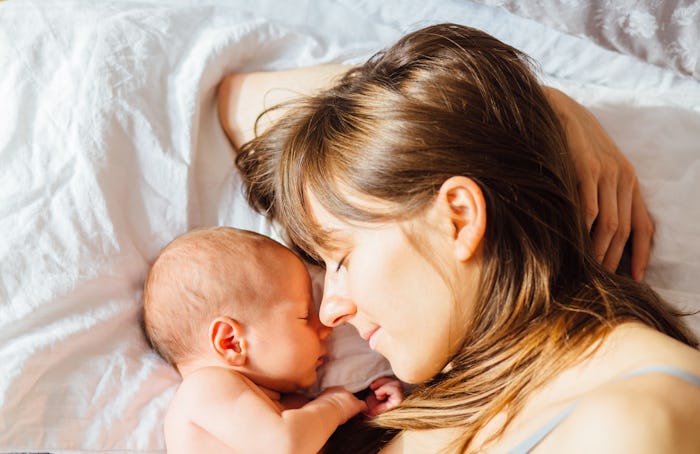Life

How To Prepare For Your First Night Of Co-Sleeping
One of the first decisions a new parent will make involves sleep, including how you're going to go about actually obtaining it. If you've chosen to co-sleep — meaning your baby is going to sleep in the same room as you and/or in an attached co-sleeper beside you — there are a few things to cross off the ole to-do list before that first night. Thankfully, it's relatively simple to prepare for your first night of co-sleeping. In fact, as long as you follow a few safety tips, co-sleeping can be a wonderful way to bond with your baby (and if you choose and/or are able to breastfeed, to feed your baby in the middle of the night).
James J. McKenna, Ph.D. Professor of Biological Anthropology and the Director of the Mother-Baby Sleep Laboratory at the University of Notre Dame, shares some guidelines for making co-sleeping safe and beneficial for you and your baby. McKenna advises moms to tie up long hair so that it doesn't represent a strangulation risk, suggests obese parents use a co-sleeping attachment for baby, and lists a slew of other suggestions, including:
"Persons taking sedatives, medications or drugs, or intoxicated from alcohol or other substances, or otherwise excessively unable to arouse easily from sleep should not co-sleep on the same surface with the infant."
The National Childbirth Trust of the United Kingdom warns parents to get rid of potential hazards in their bed before they begin co-sleeping, advising co-sleeping parents to check their mattress to make sure it is firm and to make sure a baby cannot become trapped between the wall and the bed. KellyMom backs up this recommendation, stating, "the sleep surface should be firm. Do not put a baby on a waterbed mattress, pillow, beanbag, sheepskin or any other soft surface to sleep."
The National Childbirth Trust of the United Kingdom also strongly advises parents to check their sheets fit the bed snugly and all pillows and covers are kept well clear of baby. They also remind parents that a bed is the only safe place to sleep with your baby, stating, "If you're feeling really tired and think you may fall asleep with your baby while feeding or cuddling them on a sofa or armchair, move to a bed." KellyMom confirms, saying on their own site that babies, with or without an adult, "should never sleep on a sofa, couch, futon, recliner, or other surface where baby can slip into a crevice or become wedged against the back of the chair" or sofa.
Baby Center suggests moms make sure their partner is on board before deciding to co-sleep with their baby, as it needs to be a family decision. They also recommend parents closely monitor their baby to see if they like sleeping this way. Just as not every parent is comfortable with co-sleeping, neither is every baby.
"Not every baby enjoys a shared sleeping arrangement. If you have a family bed and your baby's restless or fussy at night, you might try putting then in a bassinet or crib to see if they seem happier there."
Sleeping in a totally different room from our babies is a relatively new trend. Human beings have been co-sleeping for centuries and, if done safely and with a few precautions in mind, it can be a smart solution that can lead to better sleep for all. So, good luck and sweet dreams (hopefully)!